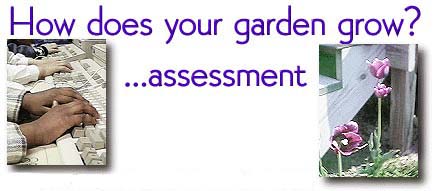I think some of the most important goals of our teaching are,
indeed, difficult and perhaps impossible to measure _by standardized
tests_ but good teachers are always assessing...
If your goal is to have kids relish our language and its
precision and to enjoy their own creations, you're watching to see their
facial expressions, checking to see if they volunteer to share their
work, and checking their writing to see evidence of their growing skill...
And, if they don't, you're finding better models, re-structuring
the learning environment, building trust in the community so that you can
achieve that goal...
Assessment needn't be standardized testing...it does, however,
need to be formalized to some degree...
I remember an education professor once eplaining how she trained
ed students in assessment...They were to write down "What matters?" to
them, to their kids, in their learning...Then they were to figure out how
they would know that their kids had attained whatever the skills or
concepts they had deemed important...
On the one hand, this sounds like a very informal type of
assessment instrument...but if you _really_ think about what matters in
your teaching, it can be a very powerful and rigorous format for
assessment.
Assessment drives curriculum....it is a self-check that keeps us
revising our lessons, learning from our kids, and improving all of our
education :)
Lynne
By stepping back and gathering data about our teaching strategies and student
learner outcomes we can make informed decisions that will enhance the growth
of our students. These assessments will tell us what practices to "prune" and what to
keep.
In addition to mandated and standardized test scores that are published it is also beneficial to share with
the tax paying community the many achievements of our students that are perhaps
not measurable by numbers. Community members who invest tax dollars in our
technology programs are asking serious questions and want us to show why they
should invest more money in our efforts. It is our challenge to show
them that, yes,
the students are performing better and we have impressive results.
Our promise is to return the favor and
send our young people into the business world prepared with skills
needed to succeed.

